The Issue
Studies of successful tourist destinations show that unless a government wisely engages its residents in seeking solutions to the impact of the growing tourism economy, frictions between local residents and the wine and hospitality industries grow. Tourism brings increased demand upon local infrastructure and heavier use of finite resources -- all impacting the quality of life for those of us who live here. In addition, the tourism and the wine industries take a heavy toll upon our ecology.
Other studies (Foder and Associates) have shown that growth beyond 1 percent per year leads to diminishing median incomes among populations in metropolitan areas. Governments tend to exaggerate the economic benefits of tourism by failing to take into account that the bulk of the revenue ends up going outside the county, to multi-national corporations. The large expenditures associated with that growth -- particularly the staggering costs of maintenance and expansion of the infrastructure that comes in cycles over several decades -- are externalized to the local taxpayers. Local governments receive a very small amount of the overall tourist revenue, such as fees, the Transient Occupancy Tax (TOT), and sales taxes. Nevertheless, local governments depend on TOT to finance destination marketing in a never-ending cycle of growth. We do not charge enough for the true cost of development.
As multinational corporations now own the bulk of the wine industry here, they monetize our fragile hillsides in the Ag Watersheds for "great cabs" and for "authentic experiences" in natural settings. Concurrently our agricultural and natural lands are urbanized and remote roadways, meant for minimal traffic loads, are seriously impacted. It is up to us, the residents of Napa County, to keep a thriving tourism economy in balance with the needs of locals and the needs of the local ecosystems.
What We're Doing
In the past, Napa Vision 2050 hosted a well-attended tourism conference to address these issues. As the expansion of remote wineries and expanded tourist visitation has crept into the hillsides and onto steep, rural, single-track roadways, the need for an ordinance or an initiative is evident.
Our Vision
We are working for a future in which our tourism and wine industries are in balance with the community and environment they exist within. Affordable housing allows workers to live within walking or short driving distance from their homes. Tourism and the wine industry remain viable, but not monocultures. Small businesses are supported as diversity in economic bases increases our county's economic resilience. Commercial activities such as restaurants and tastings concentrate in urban centers.

